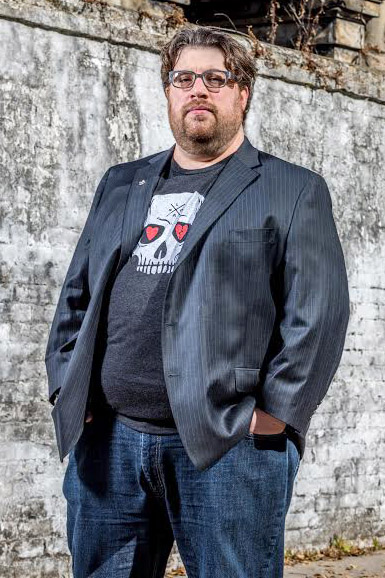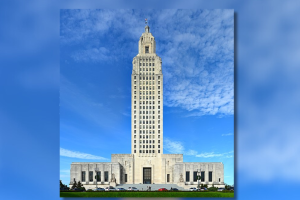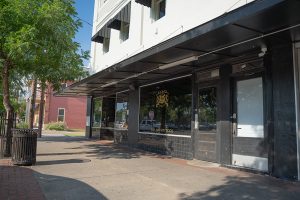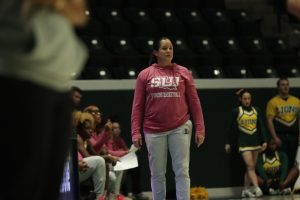Revealing the magic in devastation with literature

Courtesy of Bryan Camp
Alumnus and author Bryan Camp created a work of fiction based on New Orleans after Hurricane Katrina. In “The City of Lost Fortunes,” fictional characters examine their roles of power and trickery through different outlets.
July 23, 2018
During the weekend prior to Hurricane Katrina, alumnus Bryan Camp began working on an assignment for a university writing course. It later developed into a work of fiction that Camp determined would take a unique perspective on the natural disaster.
“Frankly, the main influence was my inability to avoid writing about it,” said Camp. “After the storm, I tried to keep writing that book, but I couldn’t ignore the devastation, nor did I feel comfortable using the looming threat of the storm as a plot device. So, instead of trying to write around the storm, I leaned into it and wrote about the aftermath.”
“The City of Lost Fortunes” chronicles a street magician, Jude Dubuisson, in post-Katrina New Orleans. When he discovers his ability to find lost things and his father’s status as a god, he plays a poker game with other gods of New Orleans.
According to bryancamp.com, the gods are “playing for the heart and soul of the city itself.”
Camp explained his decision to use some elements of fiction to chronicle true events and experiences.
“Every piece of art, especially narrative art, is aiming for some true statement about life or experience,” said Camp. “Whether it’s a murder mystery that draws on a variety of world mythologies, a realistic drama about a family’s interpersonal relationships, a children’s book with talking animals, or a book about a magical world filled with dragons, all of our stories are, at their core, human.”
Camp’s own family evacuated to his aunt’s house in Florida for about a week. At the time, he was a commuter student living in Slidell. His cousin, who attended the University of New Orleans, stayed with him in a dorm room for Camp’s last semesters at the university.
“This is the main reason why I didn’t write about the storm itself but its aftermath and recovery,” said Camp. “I experienced the storm. I saw the devastation. I helped clean out my grandmother’s house in Chalmette, but in terms of those who truly ‘survived Katrina’ and lost everything, I didn’t feel like that was my story to tell.”
At the time that Camp began the text, he was taking two courses at the university: a detective fiction course with Dr. Claire Denelle Cowart and a fiction writing workshop led by former writer-in-residence and English Department Instructor Bev Marshall.
During her graduate level creative writing class, Marshall met Camp in August 2005 and was immediately impressed with his writing skills and intricate critiques of his classmates’ work during assignments. Unfortunately, the course was interrupted by Hurricane Katrina.
Marshall explained, “Bryan has a great capacity to create alternate worlds that are, not only fascinating, but exciting and fun to read. I was impressed by his ability to revise as he listened to the comments of his fellow writers and teacher.”
Camp explained that she first prompted students to describe a room and gave details about it. She later asked participants to add something that didn’t belong to the room. He chose an angel and began to craft a narrative.
“Since I had all these detective stories rolling around in my brain, I decided to describe a seedy, backroom poker game,” said Camp.
Marshall appreciated Camp’s attention to detail, error-free prose, but most importantly, his character development.
“He understood his characters, and his compassion for them as sentient beings shone through in his work,” said Marshall.
As a writer, Camp describes his aesthetic as being influenced by a continuous chain of curiosity and suspense.
“I like dense, deceptive prose that tackles big, impossible to answer questions,” said Camp. “I like puzzles, mysteries and trickery. I like magical worlds that feel real and real worlds that feel magical.”
Trickster myth is considered to be a repetitive theme throughout the book. According to Camp, it causes those involved to consider their decisions in life and place in society. Camp explained why he included this element and what hopes he has for audience members.
“Trickster myth tends to cause people to re-evaluate their position in the world,” said Camp. “So, if I could make my readers do that, to reconsider a thing they took for granted about their privilege, or their community, or how the world works, I’d consider that a success.”
Camp published his story “The Independence Patch” in “Lightspeed Magazine” this year. A podcast and Vietnamese translation of the book was produced along with the text. His second novel will be published by Houghton Mifflin Harcourt in 2019.
Visit www.bryancamp.com to see information about Camp’s upcoming appearances and work.
Camp hopes to create a second New Orleans-inspired book. He is currently working to produce a fantasy version of French and Spanish Colonial New Orleans that will include pirates, automatons, magic and revolution.
“I’d like to write other kinds of stuff one day, too,” said Camp. “I love video games and comics, but for the near future, I’d be happy to just keep writing books.”







